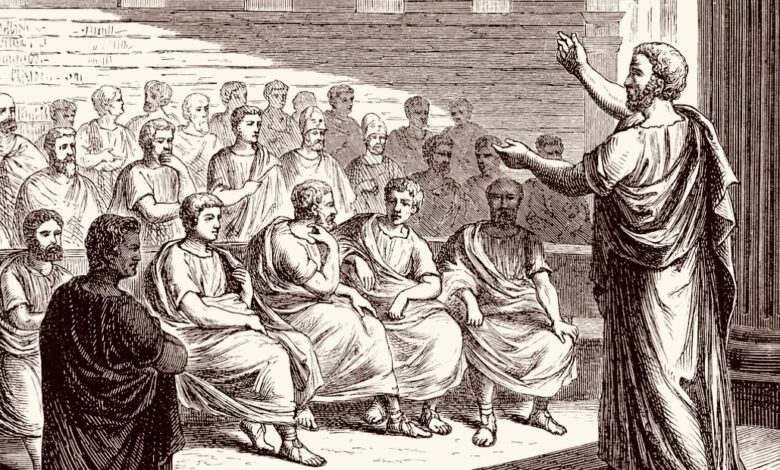A philosophical and historical analysis of democracy and the color revolution from antiquity to modern times.

Written by Khaza Muhammad Ph.D. in Classics and Romance Languages.
Philosophical and historical analysis on Democracy and color revolution from antiquities till modern era.
Written by Khaza Mohkammed PhD in classics and Romance languages .
Practically all the great Athenian intellectuals – Thucydides, Socrates, Plato, Isocrates, Xenophon, Aristotle – were to some extent critics or even opponents of democracy, at least its radical manifestations. Of greatest interest to us are the opinions about democracy in general and, in particular, the most developed, as if exemplary of all Greek democracy.
Isocrates
Isocrates believed that Democracy destroys itself because it abuses its right to freedom and equality. Because it teaches its citizens to consider audacity as a right, lawlessness as a freedom, abrasive speech as equality, and anarchy as progress.
Plato
Plato’s idea that the state should be governed by suitably selected and suitably trained philosophers, with his rapture of specialization (everyone should mind his own business, and only that which he is naturally predisposed to), did not find democracy attractive [12]. The Athenian philosopher is distinguished by dislike for any kind of thick and noisy crowd, whether in a popular assembly, court, theater or military camp (Rep., 492b), the crowd is “a huge beast” (493c). His definition of democracy is eloquent: “Democracy … is realized when the poor, having won, destroy some of their opponents, others are expelled, and the rest are equalized in civil rights and in the replacement of public posts, which in a democratic system occurs mostly by lot” (557a)[13]. It would seem
that democracy is the best state system, because complete freedom reigns, everyone does what he wants and arranges life according to his taste (557b–c). But this impression is misleading: in a democracy there is no justice, because power goes to those who accidentally fell the lot or who “revealed their disposition towards the crowd” (558c). The trouble with democracy is that, by proclaiming equality in rights, it equalizes those who are unequal by nature. In addition, in a democracy, there are actually no laws and no proper governance. People who do not want to obey do not obey, who do not want to fight when others fight, do not fight, etc.; those sentenced to death or exile roam free (558a). They do not take into account the laws there, so as not to have any master over them (563d).
Aristotle.
Aristotle considers democracy as a qualitatively worse form of the state system in comparison with the three ideal, “correct” ones (polity, aristocracy, monarchy)[17], but as the best, that is, closer to justice, more moderate (μετριώτατη) of the really existing deviations from ideal state types (democracy – deviation from polity, oligarchy – from aristocracy, tyranny – from royal power) (Pol., 1289a25-b5). The Greek philosopher defines “perverted” types as follows: “Tyranny is a monarchical power, meaning the benefits of one ruler; the oligarchy looks after the benefits of wealthy citizens; democracy – the benefits of the poor; but none of them has a common benefit in mind ”(Pol., 1279b6-10). Several times in his main political and philosophical work “Politics” Aristotle defines democracy, denoting its main features. “Democracy is usually defined by two features: the concentration of supreme power in the hands of the majority and freedom” (1310-30); here it is explained what freedom is: “the ability to do anything to anyone”; “everyone lives according to his will” (1310a33-35); “to live as everyone wants” (whereas slavery is “lack of opportunity to live as one wants” – 1317b11-14). Justice and equality are also mentioned as characteristics of democracy (1291b30-35, 1310a30-32). Aristotle identifies the following
general principles characteristic of a democratic system, obviously based on the Athenian experience of developed democracy (in fact, he describes it): “all officials are appointed from the entire composition of citizens; everyone governs each one individually, each – all, when it comes to his turn[18]; positions are filled by lot, either all or with the exception of those that require special experience and knowledge; the occupation of positions is not conditioned by any property qualification or is conditioned by the lowest qualification; no one can hold the same position twice, except for military positions; all positions, or those where it is possible, are short-term; the judiciary belongs to all, judges are elected from all citizens and judge in all cases or in most of them, namely in the most important and essential.
That is why Aristotle was opposed to democracy. Aristotle believed that the human being is a social animal where democracy is the opinion of majority and the opinion of individual basically what we call it today Liberalism and Jacobean individualism. .
Mark Tullius Cicero.
Mark Tullius Cicero (106-43 BC) is a famous Roman orator, lawyer, statesman and thinker. In his extensive work, considerable attention is paid to the problems of state and law. These issues are specially covered in his works “On the State” and “On Laws”. A number of political and legal problems are also considered in his other works (for example, in the work “ De Officiis “), as well as in his numerous political and judicial speeches.
The theoretical views of Cicero in the field of state and law are under the noticeable influence of ancient Greek thought, and above all the teachings of Plato, Aristotle, Polybius and the Stoics. At the same time, Cicero, as a patriot of Rome and a practical politician, sought to combine and harmonize this “foreign” influence with the actual Roman traditions in the field of state-legal practice and political-legal thought, with the original history of the Roman state and law, with the real situation and urgent tasks of modern him
social and political reality. In general, the creative use of the ideas of predecessors in the political and legal teachings of Cicero is combined with the development of a number of original and new provisions in the field of the theory of state and law.
Cicero defines the state (respublica) as a matter, the property of the people (res populi). At the same time, he emphasizes that “a people is not any combination of people gathered together in any way, but a combination of many people connected with each other by agreement in matters of law and common interests. Thus, in the interpretation of Cicero, the state appears not only as an expression of the common interest of all its free members, which was also characteristic of ancient Greek concepts, but at the same time also as an agreed legal communication of these members, as a certain legal entity, “general legal order”. Thus, Cicero stands at the origins of that legalization of the concept of the state, which subsequently had many adherents, up to modern supporters of the idea of a “lawful state”. Cicero saw the main reason for the origin of the state not so much in the weakness of people and their fear (the point of view of Polybius), but in their Innate need to live together.
Sharing the position of Aristotle on this issue, Cicero rejected the ideas that were widespread in his time about the contractual nature of the emergence of the state.
The influence of Aristotle is also noticeable in Cicero’s interpretation of the role of the family as the initial cell of society, from which the state gradually and naturally arises. He noted the initial connection between the state and property and shared the position of the Stoic Panetius that the reason for the formation of the state is the protection of property. Violation of the inviolability of private and public property Cicero characterizes as a desecration and violation of justice and law.
Hegel.
According to Kuno Fischer, in one of his letters to a friend, Hegel wrote: “Yesterday I saw the world spirit on a white horse.” (We are talking about Napoleon.) In this phrase one can see some Hegel’s sympathy for the events connected with the French Revolution. However, in 1807 his “Phenomenology of Spirit” was published, where he expressed his negative attitude towards the French meat grinder.
Hegel, unlike Rousseau, distinguished between the general will and the universal will. The state cannot be based on the general will, on the so-called social contract. The roots of the state, according to Hegel, go deep into history, are associated with many generations and form the moral basis of the life of the people. Therefore, there can be neither general freedom nor general equality – these questions are not decided by the whim of the crowd, are not based on the momentary desire of all. The French Revolution realized the idea of Rousseau, when to every new government all other parties became in opposition and sought to overthrow him, because they did not feel free and equal. I quote the philosopher: “But because of this, all other individuals are excluded from this action as a whole and take only a limited part in it, so that the action is no longer the action of a truly universal self-consciousness. – Thus, universal freedom (more precisely: general freedom – S.K.) cannot give any positive work or action; it remains only negative action; she is only the fury of disappearance.” And one more thing: “The only product and action of universal freedom (more precisely: general freedom – S.K.) is therefore death, and moreover, death, which has no internal volume and filling; for that which is negated is the unfulfilled point of the absolutely free self; this death, therefore, is the coldest, most vulgar death, which is no more important than if you chop up a head of cabbage or swallow a sip of water. (“The Phenomenology of the Spirit.”)
Marx and Engels
Such revolutions have often taken place in history, and their repetition is not ruled out. Let us take our October Revolution, which has enthralled and enthralled many. Unlike the French Revolution, it focused the attention of the leaders not on general freedom, but on general equality, only more radical than that which Rousseau had in mind: Marxists equalized all citizens not in small property, which the French enlightener and philosopher aspired to, but in the complete denial of private ownership of the instruments and means of production. And they chopped off the heads of all the rich, middle, prosperous even easier than a housewife cuts a head of cabbage. They also dealt with those who think differently, feel differently and believe differently, their “volume of work” was a hundred times greater than that of the Jacobins. We can say: “they sweated a lot, caught a cold, fell ill” and, in the end, were forced to surrender power.
Yes, Marx is somewhat reminiscent of Hegel. With what? And Marx is trying to build a ladder of progress. Only for Hegel this is a ladder for a rational person, and for Marx it is an unreasonable person, obsessed with the idea of universal equalization in distribution. Marx replaced the Hegelian mind with Marxism as “the only true doctrine”, the removal of alienation – with the deification of revolutionary violence, and freedom – with unanimity. However, world history remains a progress in the consciousness of freedom, and the theory of revolutions and the construction of eternal dictatorship is its perversion. In interpreting the problem of property, Hegel is a direct antipode to Marx: he is opposed to its total socialization (statization): “Since in property my will as a personal will, thereby as the will of an individual, becomes objective for me, then property acquires the character of private property, and common property, which, by its nature, can be in individual possession, receives the definition of a community dissolvable in itself, leaving my share in which is in itself a matter of arbitrariness. (“Philosophy of Law.”) I am sure that Hegel would
not have accepted the October Revolution, he would have been repulsed by subjectivism, adventurism, and unjustified cruelty.
“The task of philosophy is to comprehend that which is, for that which is is reason. As for individual people, then, of course, each of them is the child of their time; and philosophy is also time grasped in thought. It is just as absurd to suppose that any philosophy can transcend the limits of its contemporary world as it is absurd to suppose that an individual is capable of jumping over his epoch, jumping over Rhodes. . The phenomenology reads as a political manifesto full of revolutionary fervor, when Marx read the phenomenology in 1844 he reformulated Hegel’s philosophical expressions in a more materialistic way. What Hegel called the struggle between the Enlightenment and faith was an ideological mask worn by the bourgeois revolutions. While Hegel expresses these struggles in an idealistic mask, as a battle between the various forms of the human spirit, these phantom battles have a realistic basis in the forces of the material class.
Nonetheless in order to give Hegel his due, we cannot ignore that material contradictions were challenged in the realm of consciousness or in the realms of cultural and political superstructures. Hegel’s comments are ideal insofar as the elements of the superstructure take precedence. Therefore, our task is to put Hegel on his feet, or to move from Hegel’s idealism to historical materialism. This means the transition from phenomenological ideal poetry to the materialistic, realistic class struggle.
In other words, in working through Hegel, we are walking closer to Marx. As a pioneer of historical materialism, Hegel’s philosophy shows that the victory of the bourgeois Enlightenment over feudalism was a historical necessity, but not a complete victory for human freedom. As with Honor de Blazec and Charles Fourier, Hegel was an early critic of the human degeneration of bourgeois society, which he called the “spiritual animal kingdom”. What Hegel refers to in the chapter “Absolute Freedom and Terror” was the failure of the Jacobins, one of the most radical parties of the
French Revolution, to transcend the contradictions of emerging capitalism. Hegel himself could not find a way to this dilemma and blamed any revolutionary effort to overcome bourgeois inequality as a utopian act.
Marx and Engels continued this analysis of the Enlightenment and Jacobin terror, taking Hegel as a basis for them, showing that the original promises of freedom and equality were incompatible with class society. As long as the slogans of the French Revolution were accompanied by the realism of capitalism, the abstractions of the Enlightenment became concretely irrational. In their abstract terms, “freedom” has become the freedom to exploit the working class, while “equality” has become a legal trick that conceals the unequal relations between starving workers and their rich bosses. As the French novelist Anatoly France once commented, the laws, in their “great equality”, prevented the rich and the poor from sleeping under the bridge, begging in the streets, or stealing bread.
Hitherto the history repeats itself with such revolution that brings destruction not only in the state level but it dismantles the very fabric of the society. In these lines are some general thoughts about what I call the trend of imperialist liberals and how they deal with the color revolution in the Arab world and Eastern Europe. By this I mean a group of Western academics and analysts in Europe, the United States, and Canada, especially in the United States. To a large extent, they represent the dominant discourse in academia and Western media about the color revolution. But some representatives of this trend in our Arab world as well. Therefore, it is not intended here at all that this concept applies only to Westerners. But unfortunately some eastern Europeans and Arabs in fact embrace these ideas. These depend thoughts on the observations of my readings and my follow-up to many of the writings. By the imperialist liberals, I mean those who utter abstract concepts about liberalism, especially individual freedom, but with their discourse on our Arab world and the the so -called revolution in Ukraine in 2014, they established a colonial epistemological concept, or they defend and consolidate principles
or defend the interests of US imperialism or the regimes affiliated with it or benefiting from it in the region, whether with intent or without it.
References.
1. Aristotle. Politics. , Lulu.com, 6 Apr. 2017.
2. Cicero, Marcus Tullius, . The Republic and the Laws .Oxford pub,1998.
3. Hegel, Georg Wilhelm Friedrich. Phenomenology of Spirit. Motilal Banarsidass Publ, 1998.
4. Marx, Karl. Critique of Hegel’s “Philosophy of Right.” Cambridge University Press,1977.
5. Plato. THE REPUBLIC. Beyond Books Hub, 2021.



